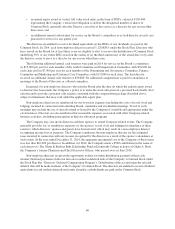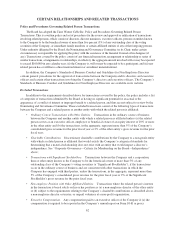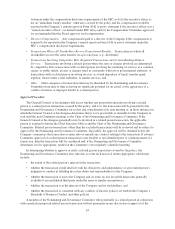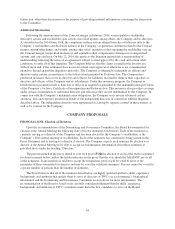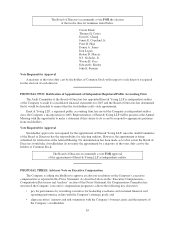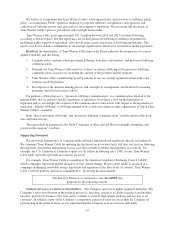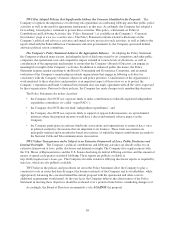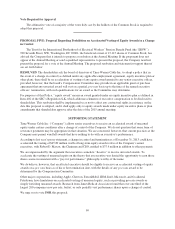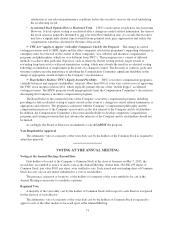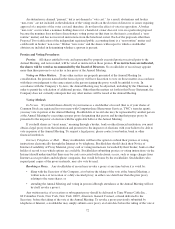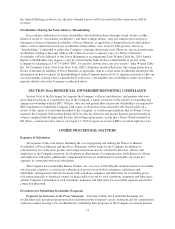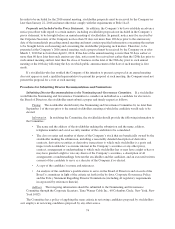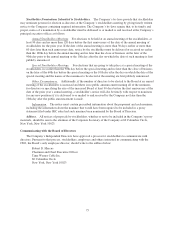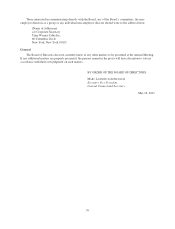Time Warner Cable 2015 Annual Report Download - page 76
Download and view the complete annual report
Please find page 76 of the 2015 Time Warner Cable annual report below. You can navigate through the pages in the report by either clicking on the pages listed below, or by using the keyword search tool below to find specific information within the annual report.
The Board of Directors recommends a vote AGAINST this
proposal for the following reasons:
The Company’s ability to attract and retain executive talent is key to its success. The Company’s
independent Compensation Committee has structured an effective and competitive executive compensation
program that reflects market practices, Company objectives and stockholders’ interests. The proposal’s
inconsistency with general market practices would hinder the Company’s ability to attract and retain qualified
executives and create misalignment between executives’ interests and those of stockholders and is, thus, not in
the best interests of the stockholders.
The benefit of the Company’s flexibility in establishing the terms of its equity awards has been borne out in
connection with the Comcast merger. The regulatory approval process in transactions in the Company’s industry
has historically been protracted, and the Comcast merger review process extended more than a year. During this
time, the Company retained its key executives, and they remain focused on the goals of the Company and its
stockholders.
➣TWC Equity Awards have a “Double Trigger” Clause. TWC’s equity awards have a best-practices
“double-trigger” acceleration provision. Executives’ equity awards do NOT vest on a change in control unless
the executive is terminated without cause within a designated period of the change-in-control event.
➣Double Trigger Strikes the Right Balance — Aligns Executives with Stockholders in a Possible
Change in Control Transaction. When a potential change in control arises, the double trigger provision creates
retention incentives and promotes direct alignment with stockholders during a time of uncertainty and potential
disruption to TWC executives.
• The double-trigger full acceleration vesting provision makes it less likely that the executive would be
resistant to an otherwise beneficial change in control based on concerns about losing equity awards if the
new owner decides to terminate the executive following closing.
• The double-trigger full acceleration vesting provision also incentivizes the executive to remain with the
Company from announcement of the change-in-control event to the close of the transaction and possibly
beyond.
• By the same token, the double trigger prevents inappropriate vesting. The executive will not see a direct
personal benefit from the transaction alone.
• The benefit of the double-trigger full acceleration vesting provision in terms of retention and alignment
with stockholder interests has been shown in connection with the Comcast merger and the continued
focus of the Company’s executive team.
➣TWC’s Program is Well Within the Mainstream. TWC’s vesting provisions in the event of a change in
control-related termination have become standard across Fortune 500 companies and, more importantly,
consistent with the benefits of TWC’s competitors for executive talent. Changing its provisions would put TWC
at a competitive disadvantage in attracting and retaining its leaders.
➣No “Windfall.” TWC executives get over half their annual target compensation opportunity in the form
of equity awards, which vest over time to encourage retention. Accordingly, permitting vesting when the
executive is denied the opportunity to stay with the Company following a change in control is not a windfall.
Instead, the double-trigger vesting provision allows the executive to receive the benefit of an equity award that
was considered “earned” but was not distributed to encourage retention only when the retention objective is no
longer relevant. Moreover, requiring previously granted equity awards to be forfeited upon a change-in-control-
related termination would result in executives undervaluing the equity portion of their compensation since they
cannot be assured they will have the opportunity to receive it under those circumstances. This would put the
Company at a competitive disadvantage in attempting to attract and retain qualified executives.
➣Value of Accelerated Awards is Limited. TWC’s equity incentive program limits the value of
accelerated awards in two significant ways:
•Awards May Remain Subject to Performance-Based Vesting Conditions. Even if the award recipient
is terminated following a change in control, the Compensation Committee may determine to require the
70


